metadesign
-
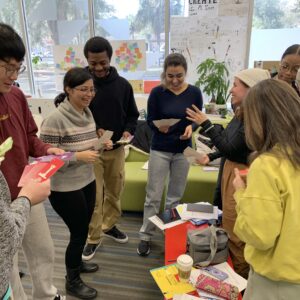
Knowledge self-management in design research
Abstract: What is the difference between knowledge and consciousness, and why does it matter for design? This lecture examines knowledge as a product of consciousness, emphasizing that while knowledge organizes what is already known, consciousness enables the creation of the new. Using examples like ChatGPT—an entity rich in knowledge but devoid of consciousness—it critiques traditional […] - Feb 9, 2025 -

Systemic userism in service design
Abstract: Userism in service design manifests as a group of humans reduced to be users (and only users) of a given service. Userism prevents these people from cocreating, codesigning, and coproducing services. Transnational (often colonialist) digital services are a case in point; however, userism also appears in analog interfaces. The systemic aspect of userism refers […] - Nov 25, 2024 -
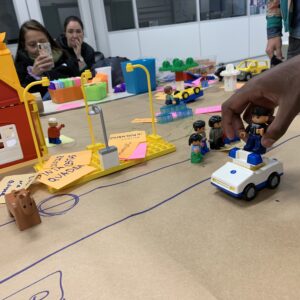
Community Design with Lego Serious Play
Every community practices the design of itself, as Arturo Escobar has pointed out in his book Designs for the Pluriverse. How can this metadesign process be more creative, imaginative, and conscious? Lego Serious Play can support Community Design in a few ways: materialize abstract values that a community wants to express, map community assets, anchor […] - Jul 20, 2024 -
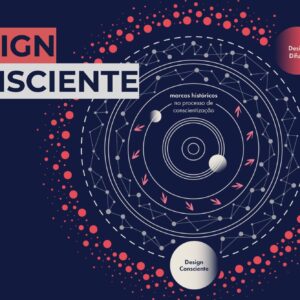
Conscious design for a women shelter (2023)
Camila Kutiski heard from a friend about a shelter service for victims of domestic violence in her neighborhood. She visited the non-profit running the service and decided to support the people involved with her Graphic Design final work at UTFPR. The first thing she did was to understand the existing design activities in the non-profit. […] - Feb 24, 2024 -
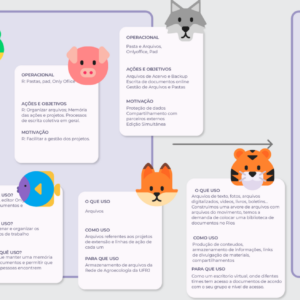 The final work of Isabela Luiza Molin de Siqueira in her Bachelor of Design studies at UTFPR is the redesign of a Computer Supported Collaborative Work platform called Rios, a tool used by social movements and non-profit organizations in Brazil that builds on their past experience of using Corais. Rios is developed by Eita Coop. […] - Jul 11, 2023
The final work of Isabela Luiza Molin de Siqueira in her Bachelor of Design studies at UTFPR is the redesign of a Computer Supported Collaborative Work platform called Rios, a tool used by social movements and non-profit organizations in Brazil that builds on their past experience of using Corais. Rios is developed by Eita Coop. […] - Jul 11, 2023 -
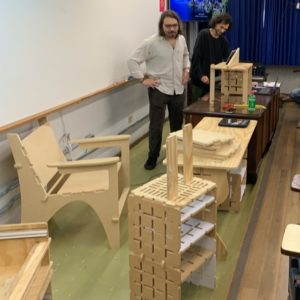 SURU’BA (“good thing” in Tupi and “orgy” in Portuguese) is the final work of João Conrado Dembiski and João Victor Tarran in their Bachelor in Design at UTFPR. Inspired by anarchist and decolonial thinking, the duo designed a modular open-source furniture system that could be cheaply produced in Curitiba, the locality of their studies. Their […] - Jul 30, 2022
SURU’BA (“good thing” in Tupi and “orgy” in Portuguese) is the final work of João Conrado Dembiski and João Victor Tarran in their Bachelor in Design at UTFPR. Inspired by anarchist and decolonial thinking, the duo designed a modular open-source furniture system that could be cheaply produced in Curitiba, the locality of their studies. Their […] - Jul 30, 2022 -
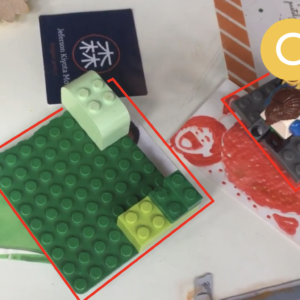 Storyblocks is the tridimensional equivalent of the storyboard: it represents the basic elements of a scene sequence in a film or animation movie through building blocks. After building the scene and materializing its components, the framing and camera movements can be experimented with using still photos or improvised videos. It is a fast low-fidelity technique […] - Mar 26, 2022
Storyblocks is the tridimensional equivalent of the storyboard: it represents the basic elements of a scene sequence in a film or animation movie through building blocks. After building the scene and materializing its components, the framing and camera movements can be experimented with using still photos or improvised videos. It is a fast low-fidelity technique […] - Mar 26, 2022 -
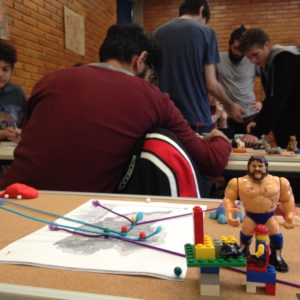 Map with a conceptual diagram of the ecosystem of interactions between people and objects in a specified past or future. These objects were firstly used as protagonists of an object theater (Buur & Friis, 2015) and, second, mapped to local ecology. Teachers provided a corkwood plate, pins, strings, Lego building blocks, and a printed map […] - Feb 3, 2022
Map with a conceptual diagram of the ecosystem of interactions between people and objects in a specified past or future. These objects were firstly used as protagonists of an object theater (Buur & Friis, 2015) and, second, mapped to local ecology. Teachers provided a corkwood plate, pins, strings, Lego building blocks, and a printed map […] - Feb 3, 2022 -
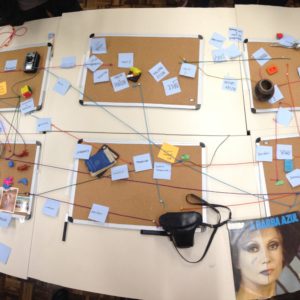 Showing an object that has endured many decades and telling the human stories that this object was part of, highlighting its relation to other objects, places, and people. The relations are drawn with strings tied to pins over several corkwood plates, which effectively grouped the objects. Can be used in Speculative Design to ground future […] - Feb 3, 2022
Showing an object that has endured many decades and telling the human stories that this object was part of, highlighting its relation to other objects, places, and people. The relations are drawn with strings tied to pins over several corkwood plates, which effectively grouped the objects. Can be used in Speculative Design to ground future […] - Feb 3, 2022 -
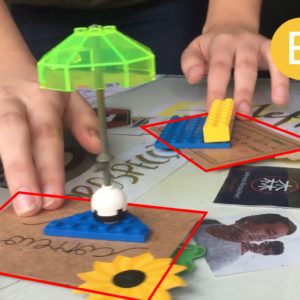
Materiality in Codesign: interaction analysis of a design experiment with building blocks
Paschoalin, Larissa and Van Amstel, Frederick M.C. (2021). Materialidade no codesign: análise interacional de um experimento com blocos de montar (Codesign Materiality: interactional analysis of a building blocks experiment). Design e Tecnologia, 11(23). https://doi.org/10.23972/det2021iss23pp82-92 - Jan 12, 2022 -
 Visual oxymoron is a graphic representation of a contradiction codesigned by those who face that contradiction in everyday life. In written language, an oxymoron is a figure of language that displays interconnected opposing ideas. A visual oxymoron displays the opposite forces of a contradiction in a single image. The representation can be made through visual […] - Jan 27, 2021
Visual oxymoron is a graphic representation of a contradiction codesigned by those who face that contradiction in everyday life. In written language, an oxymoron is a figure of language that displays interconnected opposing ideas. A visual oxymoron displays the opposite forces of a contradiction in a single image. The representation can be made through visual […] - Jan 27, 2021 -
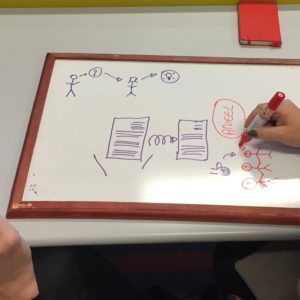 Visual dialogue is a hybrid between visual thinking, scribing, and dialogic action. In this process, ideas are expressed through simultaneous verbal and visual communication. Visual dialogue is a way of thinking and communicating that combines speech and drawing to help make abstract ideas more concrete. Often, when people start a conversation about a complex topic, […] - Jan 27, 2021
Visual dialogue is a hybrid between visual thinking, scribing, and dialogic action. In this process, ideas are expressed through simultaneous verbal and visual communication. Visual dialogue is a way of thinking and communicating that combines speech and drawing to help make abstract ideas more concrete. Often, when people start a conversation about a complex topic, […] - Jan 27, 2021 -
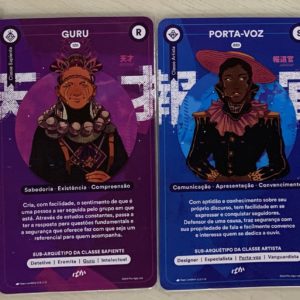
Existentialist advisory practice
When advising a thesis project, I begin by helping the student to locate the project within personal, professional, and societal development. I advise them to think about their projects as existential projects, as a way of becoming more than what they already are. We stumble upon the barriers to becoming more and question who else […] - Jan 27, 2021 -
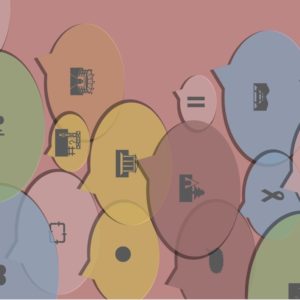
Commoning Design: a Pluriversal Slide-Deck
The Commoning Design pluriversal slide-deck is the outcome of a collaborative effort which involved people with different interests, skills, and backgrounds united by their shared curiosity around the relationship between commoning and design. Such effort took place in the context of the Participatory Design Conference 2020 and organized around the workshop “Commoning Design and Designing Commons”. This deck […] - Dec 8, 2020 -

The political body as a fulcrum for radical imagination in metadesign
Angelon, Rafaela; Van Amstel, Frederick M.C. (2020). The political body as a fulcrum for radical imagination in metadesign. In: Proceedings of the III Design Culture Symposium, Unisinos, Porto Alegre, Brasil. - Nov 9, 2020 -
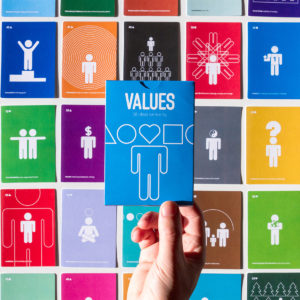 This method uses Genis Carrera’s Values Deck to visualize the priorities of a group, project, or organization. The method is relatively simple: gathering the people involved to vote on the human values they want to produce together. Each card represents a human value, such as sustainability, creativity, wealth, etc. They are laid down on a […] - Jun 10, 2020
This method uses Genis Carrera’s Values Deck to visualize the priorities of a group, project, or organization. The method is relatively simple: gathering the people involved to vote on the human values they want to produce together. Each card represents a human value, such as sustainability, creativity, wealth, etc. They are laid down on a […] - Jun 10, 2020 -
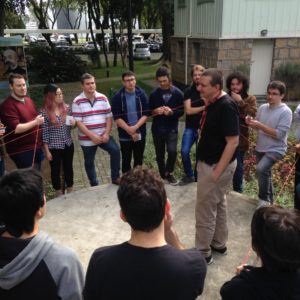 New business generates value through a provisional network of relations, including strategic partners, suppliers, and clients. Young entrepreneurs take time to understand that starting up a company does not depend on themselves only. Value-net is a strategic framework created by Cinzia Parolini (1999) to understand and manage the network of relationships within a business ecosystem. […] - May 18, 2020
New business generates value through a provisional network of relations, including strategic partners, suppliers, and clients. Young entrepreneurs take time to understand that starting up a company does not depend on themselves only. Value-net is a strategic framework created by Cinzia Parolini (1999) to understand and manage the network of relationships within a business ecosystem. […] - May 18, 2020 -
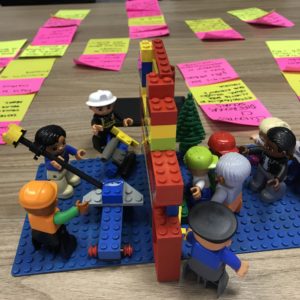
Lego Physical Oxymoron (LEPOX)
LEPOX challenges the participants to collaboratively identify and materialize a contradiction using Lego pieces. This game is inspired by the LEGO Serious Play ® method, which relies upon physical metaphors for improving team communication. The participants are invited to make a model of what they perceive to be a contradiction in terms — a physical […] - Apr 6, 2020 -
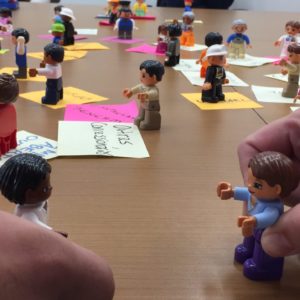
Stake Holder Analysis with Lovely Links (SHALL)
SHALL is short for Stake Holder Analysis with Lovely Links. It consists of mapping all the stakeholders possibly interested in a problem through their organization and inter-organizational relationships. Each stakeholder is mapped as a doll and relationships are loosely represented as a thread connecting the dolls. The game starts by asking the participants to map […] - Apr 6, 2020 -
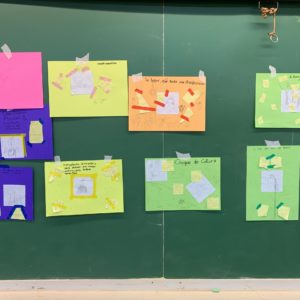 30 hours – Graphic Design — UTFPR Creativity is not a personal trait of a genius but a social activity that can be perfected through practice. The basic premise of this course was featured in a news item on TV Paraná Turismo. The TV news report conveys that creativity is not an innate talent reserved for […] - Mar 28, 2020
30 hours – Graphic Design — UTFPR Creativity is not a personal trait of a genius but a social activity that can be perfected through practice. The basic premise of this course was featured in a news item on TV Paraná Turismo. The TV news report conveys that creativity is not an innate talent reserved for […] - Mar 28, 2020 -
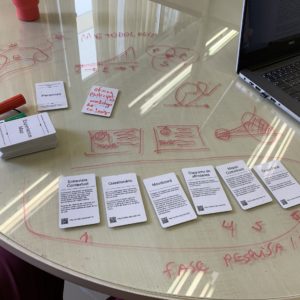
Designing Metaobjects for Collaboration, Participation and Debate
This research theoretically develops and empirically tests the concept of metaobject in design projects with special needs for collaboration, participation, or debate. Metaobjects are objects that represent and support the design of new objects in metadesign processes, such as a sketch, a model, or a prototype. In design projects, metaobjects must represent multiple perspectives and […] - Mar 25, 2020 -
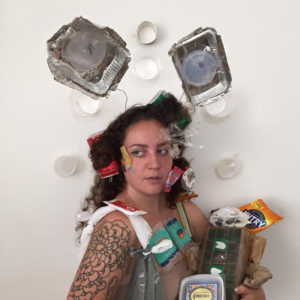 Sustainable design (Design Theory 4) is a regular 30-hour course from the Design bachelor at UTFPR. My approach for this class was to avoid discussing sustainability as a technical issue and rather to deal with the political challenges of sustainability, the crisis of modernity, and the Anthropocene, in a similar way it was done in […] - Jun 11, 2019
Sustainable design (Design Theory 4) is a regular 30-hour course from the Design bachelor at UTFPR. My approach for this class was to avoid discussing sustainability as a technical issue and rather to deal with the political challenges of sustainability, the crisis of modernity, and the Anthropocene, in a similar way it was done in […] - Jun 11, 2019 -
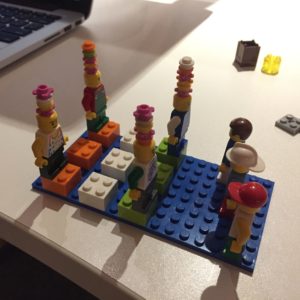 Lego is a great tool to build early prototypes of games and apps. I like. to stimulate students to supplement talking with making to increase shared understanding. Physical prototypes are quicker to build together in a team and can be used to test if ideas work in the real world. In this video, participants learn […] - Nov 22, 2018
Lego is a great tool to build early prototypes of games and apps. I like. to stimulate students to supplement talking with making to increase shared understanding. Physical prototypes are quicker to build together in a team and can be used to test if ideas work in the real world. In this video, participants learn […] - Nov 22, 2018 -
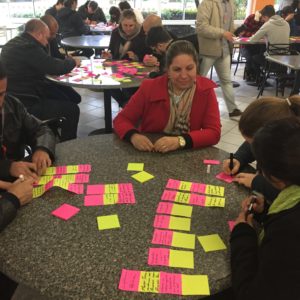
Problem Solution Problem (PSP)
The Problem Solution Problem (PSP, also known as PS³) game, developed by Frederick van Amstel and Guilherme Silveira is designed to explore and address collective creativity within the context of problem-solving. - Nov 1, 2018 -
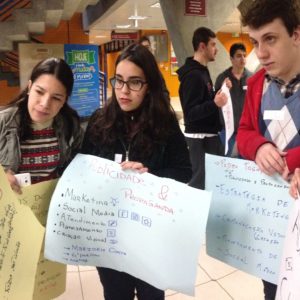 Idea Market is a design game developed to facilitate the pitching and development of new business ideas, while encouraging the formation of partnerships in entrepreneurship programs. The game simulates the dynamics of a startup ecosystem, where participants play both entrepreneurial and investor roles. Each player begins with an individual idea, sketched on paper, and progresses […] - Nov 1, 2018
Idea Market is a design game developed to facilitate the pitching and development of new business ideas, while encouraging the formation of partnerships in entrepreneurship programs. The game simulates the dynamics of a startup ecosystem, where participants play both entrepreneurial and investor roles. Each player begins with an individual idea, sketched on paper, and progresses […] - Nov 1, 2018 -
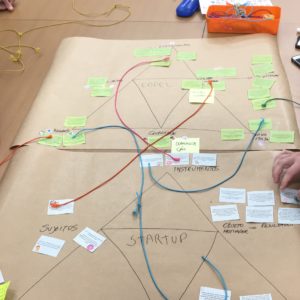 Change Laboratory is a method developed by CRADLE to help organizations change routines, deal with conflicts, and create new ideas through a participatory approach. The method consists of three different moments: 1) presenting contradictions found through ethnographic research in the organization; 2) analyzing the systemic nature of these contradictions through organizational models; 3) generating new […] - Nov 1, 2018
Change Laboratory is a method developed by CRADLE to help organizations change routines, deal with conflicts, and create new ideas through a participatory approach. The method consists of three different moments: 1) presenting contradictions found through ethnographic research in the organization; 2) analyzing the systemic nature of these contradictions through organizational models; 3) generating new […] - Nov 1, 2018 -
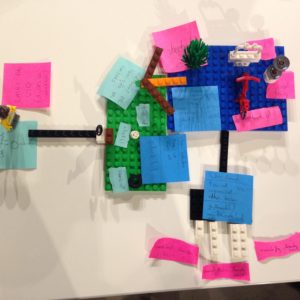 Unified Modeling Language (UML) is a set of standard diagrams and notations for creating software. We created at PUPCR a physical version of these diagrams with Lego to enable the participation of designers, clients, and users in software architecture and modeling activities. The concrete representations help the participants understand and make good use of software […] - Nov 1, 2018
Unified Modeling Language (UML) is a set of standard diagrams and notations for creating software. We created at PUPCR a physical version of these diagrams with Lego to enable the participation of designers, clients, and users in software architecture and modeling activities. The concrete representations help the participants understand and make good use of software […] - Nov 1, 2018 -
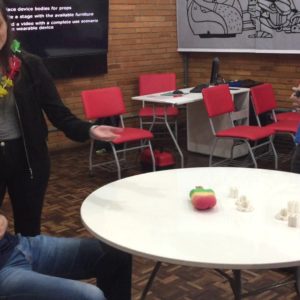 Improvised Videos are short films recorded with smartphones to support a codesign process. They represent everyday scenarios where the design object plays a protagonist role. The interaction with the design object is depicted through variegated film and theater techniques such as enactment, role playing, props, puppets, cuts, and transitions. The main advantage of using video […] - Nov 1, 2018
Improvised Videos are short films recorded with smartphones to support a codesign process. They represent everyday scenarios where the design object plays a protagonist role. The interaction with the design object is depicted through variegated film and theater techniques such as enactment, role playing, props, puppets, cuts, and transitions. The main advantage of using video […] - Nov 1, 2018 -
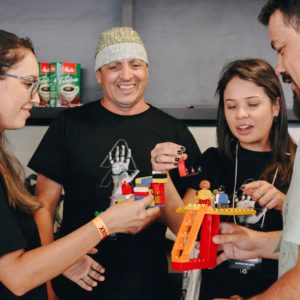 I’m developing further the Lego Serious Play method to support Expansive Design, in particular, to represent tough contradictions in a humorous style. This is useful when people avoid talking about contradictions openly or deny their existence. The pretext of play enables critical voices and radical alternatives to emerge. References Van Amstel, Frederick M.C. (2021). The […] - Oct 31, 2018
I’m developing further the Lego Serious Play method to support Expansive Design, in particular, to represent tough contradictions in a humorous style. This is useful when people avoid talking about contradictions openly or deny their existence. The pretext of play enables critical voices and radical alternatives to emerge. References Van Amstel, Frederick M.C. (2021). The […] - Oct 31, 2018 -
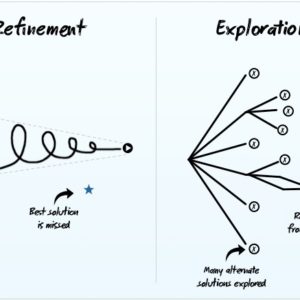
The alienation of design possibilities
The progressive contraction of design representations is synchronized with the alienation of design possibilities. Alienation means that some of the design possibilities are taken out of the design space and, therefore, never considered. These possibilities are put aside for being unacceptable, unthinkable, or unknown. This can happen by many reasons. In the socialization of the […] - Mar 16, 2015 -
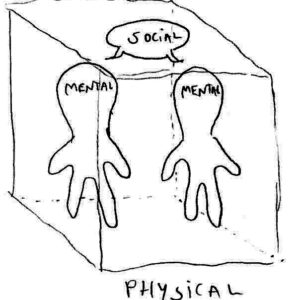
The socialization of the design space
The expansion of the design object from materials to experiences is synchronized with the socialization of the design space. The design space can be understood in three ways: Saying that, I believe there is a strong link between the physical, the social and the mental, one feeding the other. In that sense, the design space […] - Mar 16, 2015 -
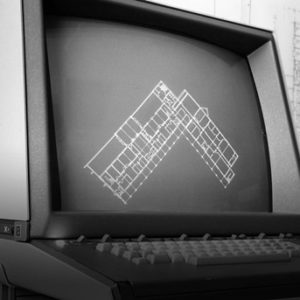
The contraction of design representations
In the last post, I described the expansion of the design object in the last centuries. This process is followed by another historical change in the opposite direction. Instead of expanding together with the object, the design representations are becoming smaller and more precise. The representations are being contracted in the hopes of corralling the […] - Mar 12, 2015 -
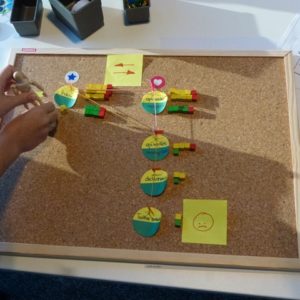
Low-tech to high-tech visualization
The World Usability Day was for the first time organized here at the University of Twente. In this event, I shared a practical output of my PhD research: a method to gather user data using low-tech materials. The method consists of collecting data through low-tech visualization and using the data to build high-tech visualizations, following […] - Nov 25, 2014 -
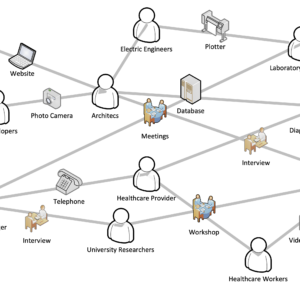
Participation and transdisciplinarity
Participation is an issue that crosses the boundaries of a single discipline. Its fundamental assumption is that people can make better decisions together than led by a single discipline. To approach participation in the renovation of healthcare facilities, it is important to consider disciplines concerned with the built environment – Architecture, Engineering, and Construction (AEC), […] - May 15, 2014 -
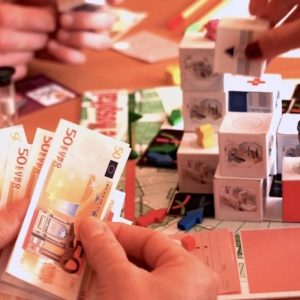
The Expansive Hospital Game (2013)
The Expansive Hospital is a board game in which players collaborate and compete to build a hospital with plastic blocks. The game design is based on research conducted with three healthcare construction projects in the Netherlands, commissioned by Pioneering. The research found that hospital design is often over schedule due to the conflicts of interests […] - Nov 12, 2013 -
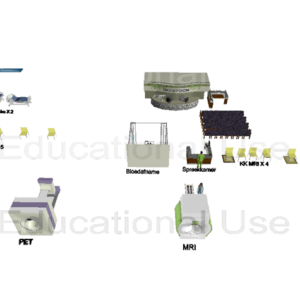
How to knit spatial layout with workflow
After realizing that the use situation is more complicated than what they thought, the managers from the CMI project organized a second user workshop to check if the current floor plan fits the workflow of scanning patients in machines such as EGG, PET-MRI, MRI, and CT. In the last workshop, a lot of time was […] - Oct 2, 2012 -
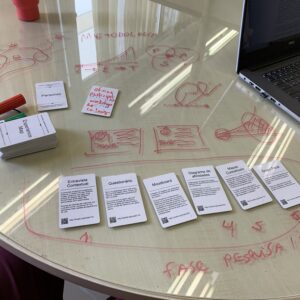 A card deck for collaborative planning user experience projects. Each card is a UX method, with the necessary inputs and the expected outputs. The cards can be organized in a linear fashion to represent the planned process. There are also cards for representing risks, expected delays, and extra human/financial resources. UX Cards enables pattern-based codesign […] - Nov 24, 2011
A card deck for collaborative planning user experience projects. Each card is a UX method, with the necessary inputs and the expected outputs. The cards can be organized in a linear fashion to represent the planned process. There are also cards for representing risks, expected delays, and extra human/financial resources. UX Cards enables pattern-based codesign […] - Nov 24, 2011 -
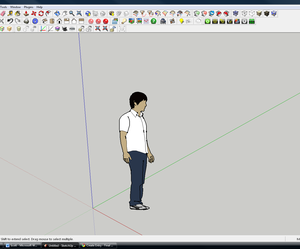
The uses of the human body in CAD
Yesterday I was in Germany for a collaborative meeting with some researchers working with computing and spation reasoning. I presented a poster outlining the challenges of my PhD research. Schloss Etelsen, the venue, couldn’t be better for reflecting about space abstract modeling. Look at the site: Coincidence or not, the 19th century castle had been […] - Jul 1, 2011 -

Co-creation tools for Architecture
Today I found a very nice example of what I’m researching in my PhD program. Liz Sanders is a well know practitioner that have written mainly about using expressive tools for users to collaborate in design process. Her papers always have some colorful pictures like that: Today I discovered through a record talk she gave […] - Jun 28, 2011 -
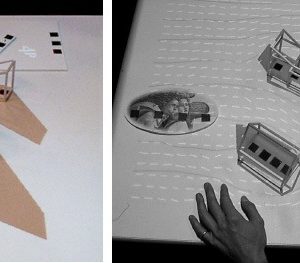
Tools for concrete collaboration
The traditional free meeting model for participation where supposedly every stakeholder can talk about their concerns often doesn’t satisfy the participants, for many reasons. The consensus is built up on participant’s fatigue; when one give up discussing a project stake not because she start to agree, but because she’s too tired to discuss it. This […] - Apr 29, 2011